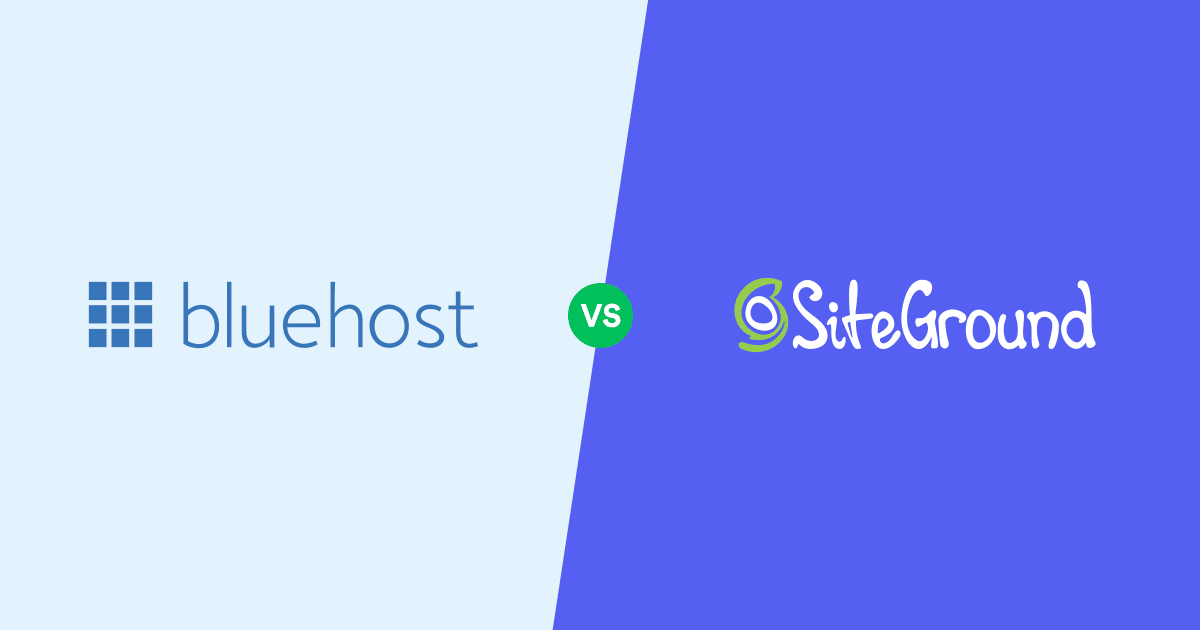
Choosing a WordPress host can be a difficult decision. A simple Google search will show you that SiteGround and Bluehost are two popular choices. However, there are some differences between these two hosts.
Fortunately, we’ve created a detailed comparison of these options. By examining their different features and pricing plans, you can determine the perfect solution for your site.
In this article, we’ll discuss Bluehost vs SiteGround. We’ll compare their features, performance, and pricing plans to help you choose the right host. Let’s get started!
An Introduction to Bluehost
Bluehost is designed to help you make the most of your WordPress site. It offers some of the most affordable hosting plans on the market:

Bluehost also offers various features that can help boost your site’s performance. You’ll also get free domain registration for your first year.
An Introduction to SiteGround
SiteGround is a powerful WordPress host that is recommended by WordPress.org and trusted by over two million domains. This company offers top-notch security and performance to help you grow your site:

SiteGround gives you access to the latest technologies to help increase your site’s speed. With this platform, your site can run up to 500 percent faster.
Bluehost vs SiteGround
Bluehost and SiteGround appear deceivingly similar at first. However, these platforms have several differences. Let’s discuss their features, pricing, and performance to see how the two compare side by side.
WordPress Features
Bluehost
Bluehost customers receive automatic WordPress installation and a professional migration service. This web host also provides free domain registration for one year.
Once you’ve set up an account, you can use the interactive interface to customize your site. Some of Bluehost’s plans include automatic backups to give you peace of mind when making edits. You’ll also receive a free SSL certificate to protect your site.
SiteGround
Thanks to SiteGround’s click-and-install option, you can enjoy automatic WordPress installation and configuration. If you already have a WordPress site, the company will help you migrate your existing content to your new hosting account.
Additionally, you can use the web host’s collaboration tools to give access to developers and contributors, or even transfer your site to another SiteGround client. This platform also allows you to create unlimited webmail accounts for your team.
SiteGround automatically backs up your site on a daily basis. Moreover, all hosting plans include a free Secure Sockets Layer (SSL) certificate to help protect your data. They even have an all-in-one security plugin as an additional layer of protection from attacks and leaks.
Performance
Bluehost
Bluehost’s plans come with a free CDN. This means your users will receive faster speeds when visiting your site.
Furthermore, most of Bluehost’s plans include unlimited storage, so you’ll never have to worry about running out of space. Even their basic plan includes an impressive 50 GB of storage.
Bluehost will automatically update your WordPress and plugins. This way, you’ll always be working with the most recent versions.
SiteGround
Like Bluehost, SiteGround offers a free CDN to help you increase your PageSpeed score. The web host also offers a caching and optimization plugin, Optimizer, that can make your site run even faster. Some plans also offer 30 percent faster PHP.
You also won’t have to worry about updating your WordPress and plugins. SiteGround will automatically do that for you.
Pricing
Bluehost
Bluehost has four plans available:
- Basic — $2.95 per month
- Plus — $5.45 per month
- Choice Plus — $5.45 per month
- Pro — $13.95 per month

All plans include a free CDN and domain registration for the first year. If you upgrade to a higher plan, you’ll receive unlimited SSD storage. The Choice Plus and Pro plans feature free automated backups for a year and domain privacy. The Pro plan will also give you a dedicated IP.
These prices are available for the first year only. Regular prices apply for plan renewals. This means you’ll pay $9.99 per month for Basic, $13.99 per month for Plus, $18.99 per month for Choice Plus, and $28.99 per month for Pro at renewal.
SiteGround
SiteGround has three plans available:
- StartUp — $3.99 per month
- GrowBig — $6.69 per month
- GoGeek — $10.69 per month

All of these plans include a free CDN, daily backups, and out-of-the-box caching, to name just a few features. With the GrowBig plan, you’ll also gain access to staging environments, 30 percent faster PHP, and on-demand copies of your backups. The GoGeek plan will get you everything in the other plans, in addition to white-label clients, priority support, and the highest tier of resources.
These special prices are available for up to the first three years only. Regular prices apply for subsequent renewals. This means you’ll then pay $14.99 per month for StartUp, $24.99 per month for GrowBig, and $39.99 per month for GoGeek.
Which WordPress Host to Choose
Now that you understand the differences between Bluehost and SiteGround, you can make an informed decision about which WordPress hosting is right for you.
Bluehost offers an all-in-one domain and hosting solution, so it’s great for beginners. You will also pay less for increased storage options with Bluehost, which can be tempting if you’re on a budget.
On the other hand, SiteGround offers better performance and advanced security measures. The company also provides enhanced features, such as in-house caching and staging environments. Overall, SiteGround may be the better choice out of the two. The advanced performance tools are worth the price when compared to what you’ll get with Bluehost’s plans.
Conclusion
Choosing a WordPress host can be a difficult decision. SiteGround and Bluehost are two of the most popular web hosts, but they offer different features and plans.
SiteGround’s hosting plans are a bit pricier, but they offer increased performance and advanced features. If you’re looking to save some money and need a host with a large storage capacity, then you may want to opt for Bluehost.
Do you have any questions about Bluehost vs SiteGround? Let us know in the comments section below!


